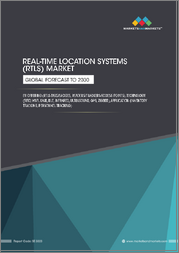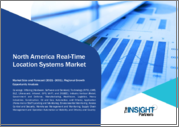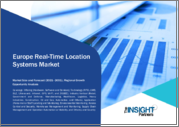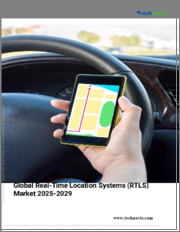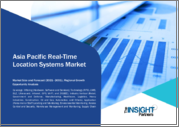
|
시장보고서
상품코드
1764836
아시아태평양의 실시간 위치추적 시스템(RTLS) 시장 예측(-2031년) : 지역별 분석 - 제공 제품별, 기술별, 업계별, 용도별Asia Pacific Real-Time Location Systems Market Forecast to 2031 - Regional Analysis - by Offering, Technology, Industry Vertical, and Application |
||||||
아시아태평양의 실시간 위치추적 시스템(RTLS) 시장은 2023년에 15억 2,464만 달러로 평가되었고, 2031년에는 122억 7,510만 달러에 달할 것으로 예상되며, 2023년부터 2031년까지 29.8%의 연평균 복합 성장률(CAGR)을 보일 것으로 예측됩니다.
5G의 등장으로 아시아태평양의 실시간 위치추적 시스템(RTLS) 시장을 주도할 것
5G 네트워크는 4G 네트워크보다 100배 빠르며, 실시간 데이터 수집이 용이하며, 5G 네트워크는 강력한 연결성과 빠른 데이터 전송을 제공하기 때문에 전 세계적으로 그 수요가 증가하고 있습니다. Association)에 따르면, 전 세계 5G 보급률은 2022년 17%에서 2030년 54%를 보일 것으로 예측되며, 5G 보급률이 가장 높은 지역은 북미로 2022년 39%에서 2030년 91%를 보일 것으로 예측되고 있습니다. 아시아태평양(중국 제외)과 유럽의 5G 보급률은 2022년 4%와 11%에서 2030년 각각 41%와 87%로 증가할 것으로 예상되며, 5G는 혁신을 가능하게 하고 디지털 전환을 지원하는 중요한 차세대 네트워크 기술이기 때문에 전 세계적으로 수요가 증가하고 있습니다. 그 수요는 전 세계적으로 증가하고 있습니다. 이에 한국 정부는 2021년 1월 차세대 모바일 네트워크, 특히 5G 커버리지를 현재 7개 주요 도시에서 올해 안에 85개 도시로 확대하고, 2021년에는 약 1억 1,589만 달러(1,279억 원)를 투자하여 민간 5G 네트워크 이용을 촉진할 것이라고 발표했습니다. 5G에 대한 투자가 확대되면 연결성이 향상되고, 내비게이션에서 응급 서비스까지 다양한 용도로 사용할 수 있는 실시간 위치 추적을 포함한 실시간 데이터 수집이 가능해집니다. 따라서 5G 네트워크의 출현은 예측 기간 동안 실시간 위치추적 시스템(RTLS) 시장에 유리한 기회를 창출할 것으로 예측됩니다.
SLAM은 실시간 데이터 수집 및 처리에 의존하여 환경을 매핑하고 위치를 추적하기 때문에 5G가 제공하는 빠른 데이터 전송 속도는 SLAM 기반 시스템의 효율성과 정확성을 향상시킬 수 있습니다. 자율주행차, 드론, 증강현실 기기 등 SLAM을 사용하는 기기의 연결성을 높여 복잡한 환경에서도 실시간으로 데이터를 전송하고 처리할 수 있습니다. 정부의 투자에 힘입은 5G 인프라의 광범위한 구축은 5G 지원 세계에서 SLAM의 기능 강화를 통해 실시간 위치추적 시스템(RTLS) 시장에 새로운 기회를 제공할 것으로 기대됩니다.
아시아태평양의 실시간 위치추적 시스템(RTLS) 시장 개요
아시아태평양의 실시간 위치추적 시스템(RTLS) 시장은 이 기술의 잠재적 이점, 비용 절감 조치의 필요성, 더 나은 환자 치료를 제공하고자 하는 열망으로 인해 크게 성장하고 있습니다. 그 결과, 헬스케어 산업에서 SLAM과 RTLS 기술의 사용은 점차 확대되고 있습니다. 수용률이 증가하고 있지만, 의료 부문이 이러한 기술을 최대한 활용하기 위해서는 여전히 큰 발전 가능성이 있습니다. 또한, 아시아태평양의 조직들은 SLAM과 RTLS가 헬스케어 용도에서 제공하는 이점을 빠르게 인식하기 시작했습니다. 의료의 질을 개선하고 의료 시설을 확대하기 위한 정부의 이니셔티브는 이 지역 전체에서 RTLS와 SLAM의 채택에 기여한 몇 가지 요인입니다.
아시아태평양의 실시간 위치추적 시스템(RTLS) 시장은 제공 제품, 기술, 산업, 용도, 국가별로 분류됩니다.
제품별로 아태지역 실시간 위치추적 시스템(RTLS) 시장은 하드웨어, 소프트웨어, 서비스로 구분되며, 2023년 아태지역 실시간 위치추적 시스템(RTLS) 시장 점유율은 하드웨어 부문이 가장 큰 비중을 차지할 것으로 예측됩니다.
시스템 유형별로 아시아태평양의 실시간 위치추적 시스템(RTLS) 시장은 RFID, UWB, BLE, 초음파, 적외선, GPS, Wi-Fi, ZIGBEE로 분류되며, 2023년 아시아태평양의 실시간 위치추적 시스템(RTLS) 시장 점유율은 BLE 부문이 가장 큰 점유율을 차지할 것으로 예측됩니다. 를 차지할 것으로 예측됩니다.
산업별로 아시아태평양의 실시간 위치추적 시스템(RTLS) 시장은 소매, 정부 및 방위, 제조, 헬스케어, 물류, 중공업, 건설, 석유 및 가스, 자동차, 기타로 분류되며, 2023년 아시아태평양의 실시간 위치추적 시스템(RTLS) 시장 점유율은 헬스케어 분야가 가장 큰 비중을 차지할 것으로 예측됩니다. 차지하고 있습니다.
용도별로 아시아태평양의 실시간 위치추적 시스템(RTLS) 시장은 인력 또는 직원 위치 확인 및 모니터링, 환경 모니터링, 출입 통제 및 보안, 창고 관리 및 모니터링, 공급망 관리 및 운영 자동화 또는 시각화, 기타로 나뉩니다. 실시간 위치추적 시스템(RTLS) 시장 점유율은 공급망 관리 및 운영 자동화 또는 시각화 부문이 가장 큰 점유율을 차지할 것으로 예측됩니다.
국가별로 아시아태평양의 실시간 위치추적 시스템(RTLS) 시장은 호주, 중국, 인도, 인도, 일본, 한국, 인도네시아, 싱가포르, 말레이시아, 대만, 기타 아시아태평양으로 분류됩니다. 부문이 가장 큰 점유율을 차지하고 있습니다.
AiRISTA Flow Inc,Aruba Networks,Impinj Inc,Kudan Inc,Microsoft Corp,NavVis GmbH,Qorvo Inc,Svensense Robotics AG,Siemens AG,Slamcore Ltd,. Sonitor Technologies AS,Stanley Black &Decker Inc,TeleTracking Technologies Inc,Ubisense Ltd,Zebra Technologies Corp는 아시아태평양의 실시간 위치추적 시스템(RTLS) 시장에서 사업을 전개하고 있는 주요 기업입니다.
목차
제1장 서론
제2장 주요 요약
- 주요 인사이트
- 시장의 매력
제3장 조사 방법
- 2차 조사
- 1차 조사
- 가설 책정
- 거시경제 요인 분석
- 기준 번호 개발
- 데이터 삼각측량
- 국가 레벨 데이터
제4장 아시아태평양의 실시간 위치추적 시스템(RTLS) 시장 구도
- PEST 분석
- 생태계 분석
- 밸류체인 벤더 리스트
제5장 아시아태평양의 실시간 위치추적 시스템(RTLS) 시장 : 주요 시장 역학
- 아시아태평양의 실시간 위치추적 시스템(RTLS) 시장 : 주요 시장 역학
- 시장 성장 촉진요인
- 시장 성장 억제요인
- 시장 기회
- 향후 동향
- 성장 촉진요인과 억제요인의 영향
제6장 아시아태평양의 실시간 위치추적 시스템(RTLS) 시장 분석
- 아시아태평양의 실시간 위치추적 시스템(RTLS) 시장 매출, 2021년-2031년
- 아시아태평양의 실시간 위치추적 시스템(RTLS) 시장 예측 분석
제7장 아시아태평양의 실시간 위치추적 시스템(RTLS) 시장 분석 : 제공 제품별
- 하드웨어
- 소프트웨어
- 서비스
제8장 아시아태평양의 실시간 위치추적 시스템(RTLS) 시장 분석 : 기술별
- RFID
- UWB
- BLE
- 초음파
- 적외선
- GPS
- Wi-Fi
- ZIGBEE
제9장 아시아태평양의 실시간 위치추적 시스템(RTLS) 시장 분석 : 업계별
- 소매
- 정부 및 방위
- 제조업
- 헬스케어
- 물류
- 중공업
- 건설
- 석유 및 가스
- 자동차
- 기타
제10장 아시아태평양의 실시간 위치추적 시스템(RTLS) 시장 분석 : 용도별
- 인원 및 스탭 위치 특정과 모니터링
- 환경 모니터링
- 입퇴실 관리 및 보안
- 창고 관리 및 모니터링
- 공급망 관리 및 오퍼레이션 자동화 또는 시각화
- 기타
제11장 아시아태평양의 실시간 위치추적 시스템(RTLS) 시장 : 국가별 분석
- 아시아태평양
- 호주
- 중국
- 인도
- 일본
- 한국
- 인도네시아
- 싱가포르
- 말레이시아
- 대만
- 아시아태평양 기타 국가
제12장 경쟁 구도
- 주요 기업의 히트맵 분석
- 기업 포지셔닝과 집중도
제13장 업계 상황
- 시장 이니셔티브
- 제품 개발
- 인수합병(M&A)
제14장 기업 개요
- Aruba Networks
- AiRISTA Flow Inc
- Impinj Inc
- Siemens AG
- Zebra Technologies Corp
- Sonitor Technologies AS
- Stanley Black & Decker Inc
- TeleTracking Technologies Inc
- Ubisense Ltd
- Slamcore Ltd
- Kudan Inc
- Microsoft Corp
- Sevensense Robotics AG
- NavVis GmbH
- Qorvo Inc
제15장 부록
LSH 25.07.16The Asia Pacific real-time location systems market was valued at US$ 1,524.64 million in 2023 and is expected to reach US$ 12,275.10 million by 2031; it is estimated to register a CAGR of 29.8% from 2023 to 2031.
Emergence of 5G Drives Asia Pacific Real-Time Location Systems Market
The 5G network is ~100 times faster than the 4G network, making real-time data acquisition easier. As the 5G network provides strong connectivity and high-speed data transfer, its demand is increasing across the world. According to the Groupe Speciale Mobile Association (GSMA), 5G penetration across the world is expected to reach 54% by 2030 from 17% in 2022. North America has the highest 5G penetration, with 39% in 2022; it is expected to reach 91% by 2030. 5G penetration in Asia Pacific (except China) and Europe is expected to increase from 4% and 11% in 2022 to 41% and 87% by 2030, respectively. As 5G is the critical new-generation network technology that can enable innovation and support digital transformation, its demand is increasing across the world. Therefore, in January 2021, the government of South Korea announced that they would increase the coverage of the next-generation mobile networks, particularly 5G, to 85 cities this year from the current seven major cities. It invested around US$ 115.89 million (127.9 billion won) in 2021 to encourage the use of private 5G networks. Growing investments in 5G will help improve connectivity and acquire real-time data, including real-time location tracking, which can be used for various applications, from navigation to emergency services. Therefore, the emergence of the 5G network is expected to create lucrative opportunities for the real-time location systems market during the forecast period.
Additionally, the SLAM technology has benefited from the rapid adoption of the 5G networks. As SLAM relies on real-time data acquisition and processing to map environments and track locations, the fast data transfer speeds offered by the 5G enhance the efficiency and accuracy of SLAM-based systems. 5G provides increased connectivity for devices using SLAM, such as autonomous vehicles, drones, and augmented reality devices, which can transmit and process data in real time, even in complex environments. The widespread rollout of 5G infrastructure, supported by government investment, is expected to create new opportunities for the real-time location system market, driven by the enhanced capabilities of SLAM in a 5G-enabled world.
Asia Pacific Real-Time Location Systems Market Overview
The real-time location systems market in APAC is experiencing significant growth owing to the potential benefits of the technology, the need for cost-saving measures, and the desire to provide better patient care. As a result, the use of SLAM and RTLS technologies in the healthcare industry has been expanding gradually. Despite the increasing acceptance rates, there is still significant development potential for the healthcare sector to utilize these technologies to their fullest extent. In addition, organizations in Asia Pacific are rapidly becoming more aware of the benefits of SLAM and RTLS for healthcare applications. Government initiatives to improve healthcare quality and expand healthcare facilities are a few factors that contributed to the adoption of RTLS and SLAM across the region.
Asia Pacific Real-Time Location Systems Market Revenue and Forecast to 2031 (US$ Million)
Asia Pacific Real-Time Location Systems Market Segmentation
The Asia Pacific real-time location systems market is categorized into offering, technology, industry vertical, application, and country.
By offerings, the Asia Pacific real-time location systems market is divided into hardware, software, and services. The hardware segment held the largest share of the Asia Pacific real-time location systems market share in 2023.
In terms of system type, the Asia Pacific real-time location systems market is segmented into RFID, UWB, BLE, ultrasound, infrared, GPS, Wi-Fi, and ZIGBEE. The BLE segment held the largest share of the Asia Pacific real-time location systems market share in 2023.
Based on industry vertical, the Asia Pacific real-time location systems market is segmented into retail, government and defense, manufacturing, healthcare, logistics, heavy industries, construction, oil and gas, automotive, and others. The healthcare segment held the largest share of the Asia Pacific real-time location systems market share in 2023.
By application, the Asia Pacific real-time location systems market is divided into personnel or staff locating and monitoring, environmental monitoring, access control and security, warehouse management and monitoring, supply chain management and operation automation or visibility, and others. The supply chain management and operation automation or visibility segment held the largest share of the Asia Pacific real-time location systems market share in 2023.
Based on country, the Asia Pacific real-time location systems market is segmented into Australia, China, India, Japan, South Korea, Indonesia, Singapore, Malaysia, Taiwan, and the Rest of Asia Pacific. China segment held the largest share of Asia Pacific real-time location systems market in 2023.
AiRISTA Flow Inc, Aruba Networks, Impinj Inc, Kudan Inc, Microsoft Corp, NavVis GmbH, Qorvo Inc, Sevensense Robotics AG, Siemens AG, Slamcore Ltd, Sonitor Technologies AS, Stanley Black & Decker Inc, TeleTracking Technologies Inc, Ubisense Ltd, and Zebra Technologies Corp are among the leading companies operating in the Asia Pacific real-time location systems market.
Table Of Contents
1. Introduction
- 1.1 Report Guidance
- 1.2 Market Segmentation
2. Executive Summary
- 2.1 Key Insights
- 2.2 Market Attractiveness
3. Research Methodology
- 3.1 Secondary Research
- 3.2 Primary Research
- 3.2.1 Hypothesis formulation:
- 3.2.2 Macro-economic factor analysis:
- 3.2.3 Developing base number:
- 3.2.4 Data Triangulation:
- 3.2.5 Country level data:
4. Asia Pacific Real-Time Location Systems Market Landscape
- 4.1 Overview
- 4.2 PEST Analysis
- 4.3 Ecosystem Analysis
- 4.3.1 List of Vendors in the Value Chain
5. Asia Pacific Real-Time Location Systems Market - Key Market Dynamics
- 5.1 Asia Pacific Real-Time Location Systems Market - Key Market Dynamics
- 5.2 Market Drivers
- 5.2.1 Rising Demand for Connected Devices
- 5.2.2 Growing E-Commerce Sector
- 5.3 Market Restraints
- 5.3.1 Rising Concerns Regarding Data Privacy and Security
- 5.4 Market Opportunities
- 5.4.1 Emergence of 5G
- 5.5 Future Trends
- 5.5.1 Growing Use of RTLS in Healthcare Sector
- 5.6 Impact of Drivers and Restraints:
6. Asia Pacific Real-Time Location Systems Market - Analysis
- 6.1 Asia Pacific Real-Time Location Systems Market Revenue (US$ Million), 2021-2031
- 6.2 Asia Pacific Real-Time Location Systems Market Forecast Analysis
7. Asia Pacific Real-Time Location Systems Market Analysis - by Offering
- 7.1 Hardware
- 7.1.1 Overview
- 7.1.2 Hardware: Asia Pacific Real-Time Location Systems Market - Revenue and Forecast, 2021-2031 (US$ Million)
- 7.2 Software
- 7.2.1 Overview
- 7.2.2 Software: Asia Pacific Real-Time Location Systems Market - Revenue and Forecast, 2021-2031 (US$ Million)
- 7.3 Services
- 7.3.1 Overview
- 7.3.2 Services: Asia Pacific Real-Time Location Systems Market - Revenue and Forecast, 2021-2031 (US$ Million)
8. Asia Pacific Real-Time Location Systems Market Analysis - by Technology
- 8.1 RFID
- 8.1.1 Overview
- 8.1.2 RFID: Asia Pacific Real-Time Location Systems Market - Revenue and Forecast, 2021-2031 (US$ Million)
- 8.2 UWB
- 8.2.1 Overview
- 8.2.2 UWB: Asia Pacific Real-Time Location Systems Market - Revenue and Forecast, 2021-2031 (US$ Million)
- 8.3 BLE
- 8.3.1 Overview
- 8.3.2 BLE: Asia Pacific Real-Time Location Systems Market - Revenue and Forecast, 2021-2031 (US$ Million)
- 8.4 Ultrasound
- 8.4.1 Overview
- 8.4.2 Ultrasound: Asia Pacific Real-Time Location Systems Market - Revenue and Forecast, 2021-2031 (US$ Million)
- 8.5 Infrared
- 8.5.1 Overview
- 8.5.2 Infrared: Asia Pacific Real-Time Location Systems Market - Revenue and Forecast, 2021-2031 (US$ Million)
- 8.6 GPS
- 8.6.1 Overview
- 8.6.2 GPS: Asia Pacific Real-Time Location Systems Market - Revenue and Forecast, 2021-2031 (US$ Million)
- 8.7 Wi-Fi
- 8.7.1 Overview
- 8.7.2 Wi-Fi: Asia Pacific Real-Time Location Systems Market - Revenue and Forecast, 2021-2031 (US$ Million)
- 8.8 ZIGBEE
- 8.8.1 Overview
- 8.8.2 ZIGBEE: Asia Pacific Real-Time Location Systems Market - Revenue and Forecast, 2021-2031 (US$ Million)
9. Asia Pacific Real-Time Location Systems Market Analysis - by Industry Vertical
- 9.1 Retail
- 9.1.1 Overview
- 9.1.2 Retail: Asia Pacific Real-Time Location Systems Market - Revenue and Forecast, 2021-2031 (US$ Million)
- 9.2 Government and Defense
- 9.2.1 Overview
- 9.2.2 Government and Defense: Asia Pacific Real-Time Location Systems Market - Revenue and Forecast, 2021-2031 (US$ Million)
- 9.3 Manufacturing
- 9.3.1 Overview
- 9.3.2 Manufacturing: Asia Pacific Real-Time Location Systems Market - Revenue and Forecast, 2021-2031 (US$ Million)
- 9.4 Healthcare
- 9.4.1 Overview
- 9.4.2 Healthcare: Asia Pacific Real-Time Location Systems Market - Revenue and Forecast, 2021-2031 (US$ Million)
- 9.5 Logistics
- 9.5.1 Overview
- 9.5.2 Logistics: Asia Pacific Real-Time Location Systems Market - Revenue and Forecast, 2021-2031 (US$ Million)
- 9.6 Heavy Industries
- 9.6.1 Overview
- 9.6.2 Heavy Industries: Asia Pacific Real-Time Location Systems Market - Revenue and Forecast, 2021-2031 (US$ Million)
- 9.7 Construction
- 9.7.1 Overview
- 9.7.2 Construction: Asia Pacific Real-Time Location Systems Market - Revenue and Forecast, 2021-2031 (US$ Million)
- 9.8 Oil and Gas
- 9.8.1 Overview
- 9.8.2 Oil and Gas: Asia Pacific Real-Time Location Systems Market - Revenue and Forecast, 2021-2031 (US$ Million)
- 9.9 Automotive
- 9.9.1 Overview
- 9.9.2 Automotive: Asia Pacific Real-Time Location Systems Market - Revenue and Forecast, 2021-2031 (US$ Million)
- 9.10 Others
- 9.10.1 Overview
- 9.10.2 Others: Asia Pacific Real-Time Location Systems Market - Revenue and Forecast, 2021-2031 (US$ Million)
10. Asia Pacific Real-Time Location Systems Market Analysis - by Application
- 10.1 Personnel or Staff Locating and Monitoring
- 10.1.1 Overview
- 10.1.2 Personnel or Staff Locating and Monitoring: Asia Pacific Real-Time Location Systems Market - Revenue and Forecast, 2021-2031 (US$ Million)
- 10.2 Environmental Monitoring
- 10.2.1 Overview
- 10.2.2 Environmental Monitoring: Asia Pacific Real-Time Location Systems Market - Revenue and Forecast, 2021-2031 (US$ Million)
- 10.3 Access Control and Security
- 10.3.1 Overview
- 10.3.2 Access Control and Security: Asia Pacific Real-Time Location Systems Market - Revenue and Forecast, 2021-2031 (US$ Million)
- 10.4 Warehouse Management and Monitoring
- 10.4.1 Overview
- 10.4.2 Warehouse Management and Monitoring: Asia Pacific Real-Time Location Systems Market - Revenue and Forecast, 2021-2031 (US$ Million)
- 10.5 Supply Chain Management and Operation Automation or Visibility
- 10.5.1 Overview
- 10.5.2 Supply Chain Management and Operation Automation or Visibility: Asia Pacific Real-Time Location Systems Market - Revenue and Forecast, 2021-2031 (US$ Million)
- 10.6 Others
- 10.6.1 Overview
- 10.6.2 Others: Asia Pacific Real-Time Location Systems Market - Revenue and Forecast, 2021-2031 (US$ Million)
11. Asia Pacific Real-Time Location Systems Market - Country Analysis
- 11.1 Asia Pacific
- 11.1.1 Asia Pacific Real-Time Location Systems Market - Revenue and Forecast Analysis - by Country
- 11.1.1.1 Asia Pacific Real-Time Location Systems Market - Revenue and Forecast Analysis - by Country
- 11.1.1.2 Australia: Asia Pacific Real-Time Location Systems Market - Revenue and Forecast, 2021-2031 (US$ Million)
- 11.1.1.2.1 Australia: Asia Pacific Real-Time Location Systems Market Share - by Offering
- 11.1.1.2.2 Australia: Asia Pacific Real-Time Location Systems Market Share - by Technology
- 11.1.1.2.3 Australia: Asia Pacific Real-Time Location Systems Market Share - by Industry Vertical
- 11.1.1.2.4 Australia: Asia Pacific Real-Time Location Systems Market Share - by Application
- 11.1.1.3 China: Asia Pacific Real-Time Location Systems Market - Revenue and Forecast, 2021-2031 (US$ Million)
- 11.1.1.3.1 China: Asia Pacific Real-Time Location Systems Market Share - by Offering
- 11.1.1.3.2 China: Asia Pacific Real-Time Location Systems Market Share - by Technology
- 11.1.1.3.3 China: Asia Pacific Real-Time Location Systems Market Share - by Industry Vertical
- 11.1.1.3.4 China: Asia Pacific Real-Time Location Systems Market Share - by Application
- 11.1.1.4 India: Asia Pacific Real-Time Location Systems Market - Revenue and Forecast, 2021-2031 (US$ Million)
- 11.1.1.4.1 India: Asia Pacific Real-Time Location Systems Market Share - by Offering
- 11.1.1.4.2 India: Asia Pacific Real-Time Location Systems Market Share - by Technology
- 11.1.1.4.3 India: Asia Pacific Real-Time Location Systems Market Share - by Industry Vertical
- 11.1.1.4.4 India: Asia Pacific Real-Time Location Systems Market Share - by Application
- 11.1.1.5 Japan: Asia Pacific Real-Time Location Systems Market - Revenue and Forecast, 2021-2031 (US$ Million)
- 11.1.1.5.1 Japan: Asia Pacific Real-Time Location Systems Market Share - by Offering
- 11.1.1.5.2 Japan: Asia Pacific Real-Time Location Systems Market Share - by Technology
- 11.1.1.5.3 Japan: Asia Pacific Real-Time Location Systems Market Share - by Industry Vertical
- 11.1.1.5.4 Japan: Asia Pacific Real-Time Location Systems Market Share - by Application
- 11.1.1.6 South Korea: Asia Pacific Real-Time Location Systems Market - Revenue and Forecast, 2021-2031 (US$ Million)
- 11.1.1.6.1 South Korea: Asia Pacific Real-Time Location Systems Market Share - by Offering
- 11.1.1.6.2 South Korea: Asia Pacific Real-Time Location Systems Market Share - by Technology
- 11.1.1.6.3 South Korea: Asia Pacific Real-Time Location Systems Market Share - by Industry Vertical
- 11.1.1.6.4 South Korea: Asia Pacific Real-Time Location Systems Market Share - by Application
- 11.1.1.7 Indonesia: Asia Pacific Real-Time Location Systems Market - Revenue and Forecast, 2021-2031 (US$ Million)
- 11.1.1.7.1 Indonesia: Asia Pacific Real-Time Location Systems Market Share - by Offering
- 11.1.1.7.2 Indonesia: Asia Pacific Real-Time Location Systems Market Share - by Technology
- 11.1.1.7.3 Indonesia: Asia Pacific Real-Time Location Systems Market Share - by Industry Vertical
- 11.1.1.7.4 Indonesia: Asia Pacific Real-Time Location Systems Market Share - by Application
- 11.1.1.8 Singapore: Asia Pacific Real-Time Location Systems Market - Revenue and Forecast, 2021-2031 (US$ Million)
- 11.1.1.8.1 Singapore: Asia Pacific Real-Time Location Systems Market Share - by Offering
- 11.1.1.8.2 Singapore: Asia Pacific Real-Time Location Systems Market Share - by Technology
- 11.1.1.8.3 Singapore: Asia Pacific Real-Time Location Systems Market Share - by Industry Vertical
- 11.1.1.8.4 Singapore: Asia Pacific Real-Time Location Systems Market Share - by Application
- 11.1.1.9 Malaysia: Asia Pacific Real-Time Location Systems Market - Revenue and Forecast, 2021-2031 (US$ Million)
- 11.1.1.9.1 Malaysia: Asia Pacific Real-Time Location Systems Market Share - by Offering
- 11.1.1.9.2 Malaysia: Asia Pacific Real-Time Location Systems Market Share - by Technology
- 11.1.1.9.3 Malaysia: Asia Pacific Real-Time Location Systems Market Share - by Industry Vertical
- 11.1.1.9.4 Malaysia: Asia Pacific Real-Time Location Systems Market Share - by Application
- 11.1.1.10 Taiwan: Asia Pacific Real-Time Location Systems Market - Revenue and Forecast, 2021-2031 (US$ Million)
- 11.1.1.10.1 Taiwan: Asia Pacific Real-Time Location Systems Market Share - by Offering
- 11.1.1.10.2 Taiwan: Asia Pacific Real-Time Location Systems Market Share - by Technology
- 11.1.1.10.3 Taiwan: Asia Pacific Real-Time Location Systems Market Share - by Industry Vertical
- 11.1.1.10.4 Taiwan: Asia Pacific Real-Time Location Systems Market Share - by Application
- 11.1.1.11 Rest of APAC: Asia Pacific Real-Time Location Systems Market - Revenue and Forecast, 2021-2031 (US$ Million)
- 11.1.1.11.1 Rest of APAC: Asia Pacific Real-Time Location Systems Market Share - by Offering
- 11.1.1.11.2 Rest of APAC: Asia Pacific Real-Time Location Systems Market Share - by Technology
- 11.1.1.11.3 Rest of APAC: Asia Pacific Real-Time Location Systems Market Share - by Industry Vertical
- 11.1.1.11.4 Rest of APAC: Asia Pacific Real-Time Location Systems Market Share - by Application
- 11.1.1 Asia Pacific Real-Time Location Systems Market - Revenue and Forecast Analysis - by Country
12. Competitive Landscape
- 12.1 Heat Map Analysis by Key Players
- 12.2 Company Positioning and Concentration
13. Industry Landscape
- 13.1 Overview
- 13.2 Market Initiative
- 13.3 Product Development
- 13.4 Mergers & Acquisition
14. Company Profiles
- 14.1 Aruba Networks
- 14.1.1 Key Facts
- 14.1.2 Business Description
- 14.1.3 Products and Services
- 14.1.4 Financial Overview
- 14.1.5 SWOT Analysis
- 14.1.6 Key Developments
- 14.2 AiRISTA Flow Inc
- 14.2.1 Key Facts
- 14.2.2 Business Description
- 14.2.3 Products and Services
- 14.2.4 Financial Overview
- 14.2.5 SWOT Analysis
- 14.2.6 Key Developments
- 14.3 Impinj Inc
- 14.3.1 Key Facts
- 14.3.2 Business Description
- 14.3.3 Products and Services
- 14.3.4 Financial Overview
- 14.3.5 SWOT Analysis
- 14.3.6 Key Developments
- 14.4 Siemens AG
- 14.4.1 Key Facts
- 14.4.2 Business Description
- 14.4.3 Products and Services
- 14.4.4 Financial Overview
- 14.4.5 SWOT Analysis
- 14.4.6 Key Developments
- 14.5 Zebra Technologies Corp
- 14.5.1 Key Facts
- 14.5.2 Business Description
- 14.5.3 Products and Services
- 14.5.4 Financial Overview
- 14.5.5 SWOT Analysis
- 14.5.6 Key Developments
- 14.6 Sonitor Technologies AS
- 14.6.1 Key Facts
- 14.6.2 Business Description
- 14.6.3 Products and Services
- 14.6.4 Financial Overview
- 14.6.5 SWOT Analysis
- 14.6.6 Key Developments
- 14.7 Stanley Black & Decker Inc
- 14.7.1 Key Facts
- 14.7.2 Business Description
- 14.7.3 Products and Services
- 14.7.4 Financial Overview
- 14.7.5 SWOT Analysis
- 14.7.6 Key Developments
- 14.8 TeleTracking Technologies Inc
- 14.8.1 Key Facts
- 14.8.2 Business Description
- 14.8.3 Products and Services
- 14.8.4 Financial Overview
- 14.8.5 SWOT Analysis
- 14.8.6 Key Developments
- 14.9 Ubisense Ltd
- 14.9.1 Key Facts
- 14.9.2 Business Description
- 14.9.3 Products and Services
- 14.9.4 Financial Overview
- 14.9.5 SWOT Analysis
- 14.9.6 Key Developments
- 14.10 Slamcore Ltd
- 14.10.1 Key Facts
- 14.10.2 Business Description
- 14.10.3 Products and Services
- 14.10.4 Financial Overview
- 14.10.5 SWOT Analysis
- 14.10.6 Key Developments
- 14.11 Kudan Inc
- 14.11.1 Key Facts
- 14.11.2 Business Description
- 14.11.3 Products and Services
- 14.11.4 Financial Overview
- 14.11.5 SWOT Analysis
- 14.11.6 Key Developments
- 14.12 Microsoft Corp
- 14.12.1 Key Facts
- 14.12.2 Business Description
- 14.12.3 Products and Services
- 14.12.4 Financial Overview
- 14.12.5 SWOT Analysis
- 14.12.6 Key Developments
- 14.13 Sevensense Robotics AG
- 14.13.1 Key Facts
- 14.13.2 Business Description
- 14.13.3 Products and Services
- 14.13.4 Financial Overview
- 14.13.5 SWOT Analysis
- 14.13.6 Key Developments
- 14.14 NavVis GmbH
- 14.14.1 Key Facts
- 14.14.2 Business Description
- 14.14.3 Products and Services
- 14.14.4 Financial Overview
- 14.14.5 SWOT Analysis
- 14.14.6 Key Developments
- 14.15 Qorvo Inc
- 14.15.1 Key Facts
- 14.15.2 Business Description
- 14.15.3 Products and Services
- 14.15.4 Financial Overview
- 14.15.5 SWOT Analysis
- 14.15.6 Key Developments
15. Appendix
- 15.1 About Us










